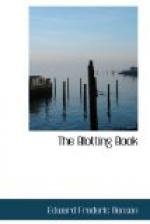The inquest was held at Falmer on the Monday following, when the body was formally identified by Mr. Taynton and Mills’s servant, and they both had to give evidence as regards what they knew of the movements of the deceased. This, as a matter of fact, Mr. Taynton had already given to Figgis, and in his examination now he repeated with absolute exactitude what he had said before including again the fact that Morris had gone up to town on Friday morning to try to find him there. On this occasion, however, a few further questions were put to him, eliciting the fact that the business on which Morris wanted to see him was known to Mr. Taynton but could not be by him repeated since it dealt with confidential transactions between the firm of solicitors and their client. The business was, yes, of the nature of a dispute, but Mr. Taynton regarded it as certain that some amicable arrangement would have been come to, had the interview taken place. As it had not, however, since Morris had not found him at his flat in town, he could not speak for certain on this subject. The dispute concerned an action of his partner’s, made independently of him. Had he been consulted he would have strongly disapproved of it.
The body, as was made public now, had been discovered by accident, though, as has been seen, the probability of Mills having got out at Falmer had been arrived at by the police, and Figgis immediately after his interview with Mr. Taynton on the Saturday evening had started for Falmer to make inquiries there, and had arrived there within a few minutes of the discovery of the body. A carpenter of that village had strolled out about eight o’clock that night with his two children while supper was being got ready, and had gone a piece of the way up the path over the downs, which left the road at the corner of Falmer Park. The children were running and playing about, hiding and seeking each other in the bracken-filled hollows, and among the trees, when one of them screamed suddenly, and a moment afterward they both came running to their father, saying that they had come upon a man in one of these copses, lying on his face and they were frightened. He had gone to see what this terrifying person was, and had found the body. He went straight back to the village without touching anything, for it was clear both from what he saw and from the crowd of buzzing flies that the man was dead, and gave information to the police. Then within a few minutes from that, Mr. Figgis had arrived from Brighton, to find that it was superfluous to look any further or inquire any more concerning the whereabouts of the missing man. All that was mortal of him was here, the head covered with a cloth, and bits of the fresh summer growth of fern and frond sticking to his clothing.




